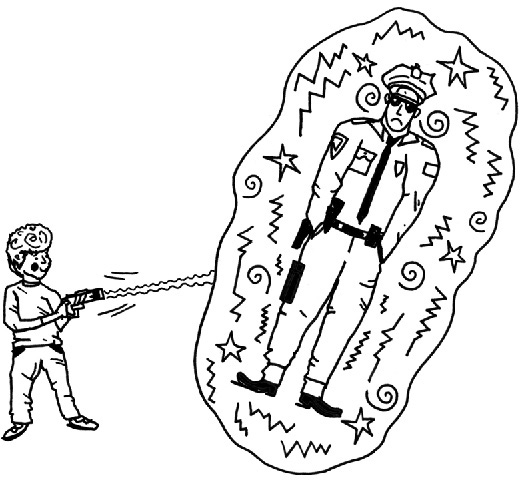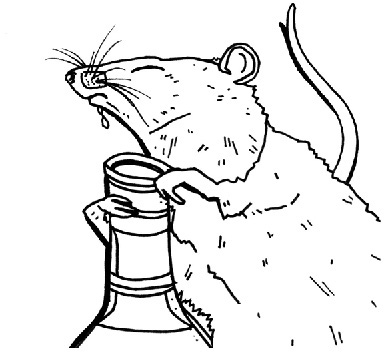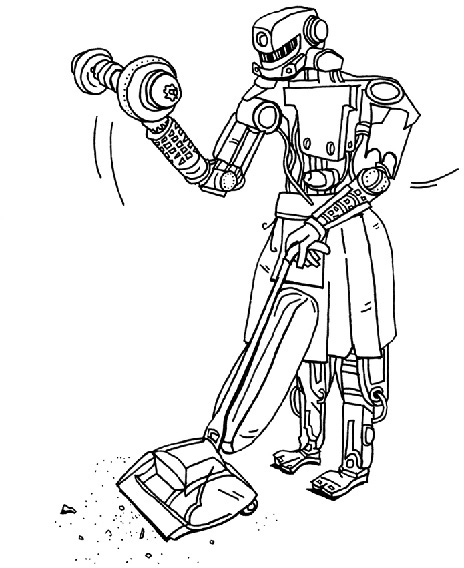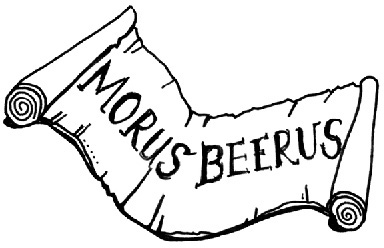

RAFFLES▶
Louisiana police offered raffle winners the chance to fire a taser at one of their officers.
The ‘Tase-a-Cop’ promotion was meant as an educational tool to teach children how tasers work, as well as a way to raise money for the department’s Christmas charity. After the advertisement went viral, the police had to post a clarification on Facebook stating that the prize could be claimed only by adults, that the taser’s electrodes would be connected to the officer beforehand rather than being ‘shot’ at him, and that it would all be overseen by a trained certified instructor (apparently there wasn’t enough space on the advert to include such details). A number of parents expressed their concern at the prospect of their children watching a cop being tasered, but the police department sought to reassure them by saying that there were other activities on offer, too – such as water guns and a dunking booth where they could dunk a policeman.

RAILWAYS▶
Railway innovations of the year included:
▶ Country: Ukraine
Innovation: Free journeys for poetry buffs. The Ukrainian Metro offered free journeys to anyone who could recite a poem by the country’s national poet, Taras Shevchenko, on his birthday. The only drawback was that the offer applied at only three stations and for only 40 minutes at two of them. Lucky poetry reciters stood to save a maximum of 12p on their next journey.
▶ Country: Mexico
Innovation: The ‘penis seat’. The seat, complete with protruding genitals, was introduced on Mexican metro trains, was uncomfortable to sit on and was reserved for men only. Its intention was to force men to experience the discomfort that women face when they’re sexually harassed on trains.
▶ Country: China
Innovation: The world’s first driverless, trackless train. It’s fitted with sensors that respond to the shape of the road, effectively travelling on virtual tracks that negate the need for physical ones.
▶ Country: India
Innovation: The country’s first solar-powered train – though the train will actually be pulled along by a diesel locomotive, with the solar power fuelling air conditioning and lights within the carriages.
RANSOMWARE▶
Ransomware caused misery to more than 300,000 computer users worldwide, but caused joy to the 590 Australians who had their traffic fines cancelled.
Ransomware is the general name for any computer virus that stops you from accessing your files unless you pay a ransom. The most notorious example of the year was WannaCry, which spread to millions of computers worldwide, including many in Britain’s health service. In Australia, it hit Victoria’s speed cameras when a maintenance worker inserted an infected USB stick into the system. As a result, the cameras continually turned themselves off and on again. Because the data they collected was felt to be unreliable, almost 600 fines were cancelled.
WannaCry actually had its ransom paid fewer than 400 times, and so made only $120,000. But the money has not (at time of writing) been withdrawn by the virus’s creators, and it looks as though it might never be, as it is kept in a couple of bitcoin accounts that are relatively easy for law enforcers to trace.
The next attack, known as either Petya or NotPetya, depending on who you spoke to, was even less successful. It made a little over $10,000 for its inventors. But, as many pointed out, those sending these attacks may have been less interested in the money than in causing as much chaos and misery as possible.
RATS▶
Police in India blamed rats for drinking all their confiscated alcohol.

To cut down on domestic violence and poverty, the Indian state of Bihar banned alcohol last year, and ended up confiscating 900,000 litres in just 12 months. Eventually the police had to rent extra premises to house all the contraband they’d seized, as they weren’t allowed to destroy it without a court order.
And yet, when officials asked if they could examine the seized alcohol, it turned out that almost all of it had mysteriously disappeared. Officers claimed that it must have been drunk by rats, which must have nibbled off the lids. A member of the state government, Devesh Chandra Thakur, said this explanation was ‘the most absurd claim that has ever been made’. In unrelated news, the president of the Bihar Policemen’s Association was arrested on suspicion of consuming alcohol.*
This isn’t the only time this year that criminal rats have allegedly struck. In May, a customs officer in Udaipur was asked to produce in court some alcohol that had been seized from a resident eight years ago. He turned up with empty bottles, explaining that rats were to blame. And in March, police in the state of Maharashtra blamed rats for eating a stash of 25 kilos of marijuana being held in a warehouse.
A 2016 study found that rats drink more alcohol when they’re stressed, suggesting India’s rats must be the most stressed on the planet.
RECALLS▶
Recalls this year included double-strength gin, bony hot dogs, and a range of salads with extra bat.
A batch of Bombay Sapphire gin was recalled after it was discovered it had an alcohol content of 77 per cent, rather than the more normal 40 per cent. A spokeswoman for Bacardi, which owns Bombay Sapphire, said the extra-boozy gin was ‘not unsafe to drink’, but that the firm ‘do not recommend consumption of the product’. Only a fifth of it was returned.
Other recalls this year included a batch of hash browns which were reported to have potentially included ‘extraneous golf ball material’, 3 million kilos of hot dogs which may have contained fragments of bone, and a salad range from Walmart after a dead bat was found in one packet.
RELIGION▶
For how to find your nearest priest, see Apps; for a DJ monk dropping beats and chants, see Buddhists; for a pastor playing Hugh Hefner, see Carnivals; for a sermon thanking God for a Premier League victory, see Chelsea; for holy toys, see Fidget Spinners; for earthquake beer made by monks, see Food and Drink; for the priest who took on the Mafia, see Godfather; for the Muslims with the keys to Christ’s tomb, see Jesus; for a missing monk, see Lost and Found; for a Protestant android, see Robots; and for Mother Theresa™, see Trademarks.
RESTAURANTS▶
For an avocado restaurant, see Avocados; for a Nutella cafe, see Nutella; for a rat cafe, see Rats.
RETIREMENT▶
Daniel Day-Lewis announced his retirement from acting. For the fourth time.
The first time he did so was in 1989 when, while playing Hamlet, he left the stage after making contact with his deceased father mid-performance. Eyewitnesses said he started crying and then just walked offstage without finishing the play. The second time was in 1997, when he moved to Florence to become an apprentice shoemaker. On the third occasion, in 2002, he decided to move back to Ireland to learn rural skills like stonemasonry. His latest retirement comes without an explanation, and his publicists refuse to divulge the reason. It is rumoured that he intends to become a dressmaker.
Other retirements this year include Japan’s oldest female porn star, who has quit aged 80, having got into the industry 9 years ago,* and a 6-foot-tall anthropomorphic turd called Mr Floatie, who for 13 years has been protesting about the dumping of raw sewage in Canadian waters, and who was mascot to Canada’s People Opposed to Outfall Pollution, or POOP.
RIP▶
People who passed away this year included: the oldest person in the world (117 – see Oldest Age); Joseph Goebbels’s secretary (106); the journalist who discovered that the Second World War had started (105 – see Hollingworth, Clare); the creator of ‘the hardest logic puzzle ever’ (97); a former president of Finland who held all his press briefings in a sauna (93); the inventor of underwater television (92); a ‘mildly eccentric’ Tory MP who once arrived at Parliament on horseback (91); the ‘Father of Pac-Man’ (91); a man who claimed to have invented the Magnum ice cream* (89); the author of The Exorcist (89); the actor who played Batman in the 1960s (88); the actor who played Godzilla in the 1950s (88); the man who coined the word ‘homophobia’ (87); the creator of G.I. Joe and ThunderCats (84); a dictator who dressed his teddy bears as soldiers (83 – see Noriega, Manuel); the inventor of the Hawaiian pizza (83 – see Pizza); the skier who popularised crouching down as you ski (83); the last man to walk on the moon (82); the woman who popularised the word ‘Ms’ (78); a man who was shot in 1958, but only died from the bullet 59 years later (77); a Russian military officer who saved the world from a global nuclear apocalypse in 1983 (77); the dad of the living dead (77 – see Zombies); the man who brought karate to Plymouth (77); the founder of Fox News (77); the footballer who scored a hat trick in 90 seconds – the fastest ever (71); the man who created the rainbow flag symbolising LGBTQ pride (65); a man who was killed for a reality TV show that didn’t exist (44 – see Kim Jong-Nam, Assassination of); and the founder of the Death Cafe movement (44).
Animals that passed away this year included: the oldest known killer whale (100+); the oldest aquarium fish (100+); the world’s oldest hippo (65); the oldest known gorilla (60); Britain’s oldest donkey (53); the world’s oldest known sloth (43); Britain’s oldest known wombat (31); and a Thai turtle that ate 1,000 coins (25).
… Didn’t they do well.
ROBOTS▶
The border between North and South Korea is guarded by robots.
The SGR-A1 robots, which are South Korean guns that have an autonomous mode, can theoretically identify the enemy and fire on them without any human input, though this feature hasn’t been utilised yet. The UN has been discussing how to regulate autonomous weapons on battlefields of the future, prompting a group of more than 100 scientists and artificial intelligence experts including Elon Musk and Stephen Hawking to sign a letter calling on world leaders to ban ‘killer robots’.
The letter was signed in the same week that a group of computer scientists at IOActive, a cybersecurity group, showed that a popular humanoid robot could be hacked. They took UBTECH’s Alpha 2 robot, which is designed to help around the house, and programmed it to stab a tomato repeatedly with a screwdriver. In Russia, meanwhile, a 6-foot-tall humanoid robot called FEDOR was unveiled. FEDOR can lift weights, do press-ups, and fire guns with both hands at the same time. Russia’s Deputy PM Dmitry Rogozin said, ‘We are not creating a Terminator,’ and explained that giving FEDOR the ability to fire guns was simply to ‘improve its motor skills’.

Less violent robots that hit the news this year included: the BlessU-2, a robot that can issue Protestant blessings; a robot that can perform Buddhist funerary rites (see Buddhists); a robot called Sally that makes salads; a robot called Flippy that flips burgers; a robot that can turn wheels of cheese over, known as Tina the Turner; a volleyball-playing robot that has three arms; a piano-playing robot that has 53 fingers; a love-doll that can be programmed with more than 50 positions; and a robot that can carry out tiny manoeuvres in your bottom to make colonoscopies less unpleasant.
ROME, ANCIENT▶
Scientists finally worked out why ancient Roman concrete is better than ours, but can’t make it because we’ve lost the recipe.
The mystery of why 2,000-year-old ancient Roman sea walls and piers have remained standing, while modern-day concrete ocean structures corrode within years, has finally been solved. Astonishingly, it turns out that Roman concrete gets stronger over time.
Scientists at the University of Utah found that the material undergoes a rare chemical reaction. Every time the seawater corrodes a bit of it, new crystals are formed which make the structure stronger until it’s rock-like. Unfortunately, despite knowing what elements make up the walls – the ingredients include, among other things, volcanic ash – we’ve lost the instructions on how to bake it. Scientists are now trying to reverse-engineer the process to discover how it’s made. If they’re successful, we could revert to using the ancient technology on our shorelines.
In other ancient Roman news, a ban on centurions standing outside the Colosseum was overturned after they won a battle with the local city council. The ban came about last year following numerous complaints that the centurions, who make their living posing for photos with tourists, were getting into fights with each other and with the tourists. However, a court overturned the ban following an appeal by the Centurion Street Artists Association, and so once again the centurions are free to roam Rome. The council haven’t given up yet, saying, ‘The city cannot be held hostage by centurions.’

RUSSIA INVESTIGATION
Dan: So one of the many people now investigating Donald Trump’s ties to Russia is a man called Bobby Three Sticks.
Andy: Obviously, I’m already hooked.
Dan: Well, his real name is Robert Mueller III, hence the nickname ‘Bobby Three Sticks’.
James: That’s fantastic. Was he the guy who took over after Comey?
Dan: Sort of. He’s now leading one of the many investigations into Trump’s links to Russia, at any rate. Trump fired James Comey, the former FBI director, and claimed it was because of Comey’s investigation of Hillary’s emails; but a lot of people think it was because he wouldn’t let the Russian investigation drop.
Andy: You know when he was fired, Comey actually thought it was a joke. He was giving a lecture to his FBI staff, and he saw it on TV in the background and he thought he was being pranked.
Anna: He and Trump didn’t exactly see eye to eye; apparently when Trump kept talking to him about Russia, he went to the Attorney General, basically America’s chief lawyer, and said, ‘Please don’t let me be left alone with him any more.’
James: Yes. And the other thing is that Comey found Trump so unnerving that when they were in the Oval Office, Comey supposedly tried to camouflage himself by wearing a blue suit and standing in front of a blue curtain.
Anna: I’m not sure I’d trust a man to be head of the FBI if he sees a curtain and thinks, ‘I’m going to hide in front of that, rather than behind it.’ He sounds like an idiot.
Andy: And they’d have had to be tall curtains, because Comey is 6 foot 8. He’s 4 inches taller than Trump’s personal bodyguard. As you’d expect, he quite likes basketball.
James: So because of this whole investigation we now know that during the election campaign Donald Trump’s son, Donald Jr, met with Russians to discuss some dirt that they might have on Hillary. The guy who organised it was called Robert Goldstone, but he didn’t try to keep it secret by any stretch. He even checked into Trump Tower on Facebook on the day of the meeting.
Dan: Did you know that Russia weren’t only accused of meddling in the US election? They were also accused of meddling in the Stoke by-election.
Anna: Well, it was the obvious next step after the US. They tested their techniques in America and then decided to go for the big guns.
Dan: Exactly. So what happened is that fake-news makers who were previously sending out positive stories about Donald Trump were now sending out stories about Stoke.
James: I can see that anyone spreading positive stories about Stoke would immediately arouse suspicion.

RSPCA▶
Calls to the RSPCA this year came from a person who was worried about a distressed bird that turned out to be their fire alarm; another who believed they’d discovered an escaped tortoise which turned out to be made of stone; and someone who reported a wound under the tail of a stray cat that turned out to be its anus.
RUNNER, DOING A▶
One hundred and sixty people avoided a restaurant bill by doing the conga.
In February, Spain’s restaurants fell victim to a ‘dine-and-dash’ gang who ate huge amounts of food and drink before running off. In their first hit, a group of up to 160 people paid a deposit of 900 euros, ate a 2,000-euro meal, then fled within a single minute before staff could react. According to one account, waiters didn’t realise the diners were leaving ‘because they seemed to be dancing the conga. They exited the restaurant in a row.’ Next, the gang paid a 1,000-euro deposit at a different restaurant, ate 10,000 euros’ worth of food and drink, and then disappeared in the space of five minutes. A man was later arrested on suspicion of being the gang’s ringleader.
Elsewhere, an Australian rapper was arrested after he allegedly ran into the sea to avoid paying up. A Queensland court heard that the rapper, known as 2pec (real name Terry Peck), had eaten two lobsters and a baby octopus, and drunk several beers and 21 vodka oyster shots. He was pursued on jet skis by police and, after an unsuccessful attempt to hide underwater, tried to kick the officers as they apprehended him. In court, charged with stealing and assault, he claimed he had actually run out of the restaurant to help a friend who was giving birth on the beach, and that the lobsters had been overcooked anyway.
RWANDA▶
Rwanda’s president claimed victory in the country’s election, a month before the ballots opened.
There are 11 political parties in Rwanda, but eight of them didn’t bother fielding a candidate, instead backing the existing president Paul Kagame. In his first campaign rally, Kagame told his supporters that he effectively won this year’s election back in 2015 when the country voted to amend the constitution in his favour, allowing him to be president until 2034 if he feels like it. The election went ahead anyway, and Kagame won 98.6 per cent of the vote.
This year, Rwanda became the latest country to ban the import of used clothing, in an attempt to help local textile industries. It was a particularly difficult decision, as most of the clothes are donated by American charities, and in response to the new law the USA suspended Rwanda’s duty-free trade agreement. American used-clothes lobbying groups say that the ban, which already exists in Kenya, Uganda, Burundi, Tanzania and South Sudan, causes significant economic hardship to the USA’s used-clothing industry.
Rwanda also announced it’s delivered over 2,600 units of blood by drone over the past year as part of a new push to get medical supplies to rural areas. Doctors request blood for patients via a WhatsApp message. The blood is then loaded on to a drone that flies autonomously to the destination at up to 100km/h, texts the doctor when it’s arriving, descends to 10 metres above the ground, drops the package and returns to base. The blood is attached to a parachute to ensure a safe landing.